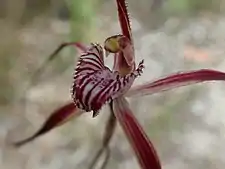| Chapman's spider orchid | |
|---|---|
.jpg.webp) | |
| Caladenia chapmanii growing near Dunsborough | |
| Scientific classification | |
| Kingdom: | Plantae |
| Clade: | Tracheophytes |
| Clade: | Angiosperms |
| Clade: | Monocots |
| Order: | Asparagales |
| Family: | Orchidaceae |
| Subfamily: | Orchidoideae |
| Tribe: | Diurideae |
| Genus: | Caladenia |
| Species: | C. chapmanii |
| Binomial name | |
| Caladenia chapmanii Hopper & A.P.Br. | |
Caladenia chapmanii, commonly known as Chapman's spider orchid, is a plant in the orchid family Orchidaceae and is endemic to the south-west of Western Australia. It has a single erect, hairy leaf and up to three flowers which are either maroon, yellow or cream-coloured.

Description
Caladenia chapmanii is a terrestrial, perennial, deciduous, herb which often grows in large groups. It has an underground tuber and a single erect, hairy leaf 15–20 cm (6–8 in) long and 2–5 mm (0.08–0.2 in) wide. The inflorescence is a raceme, 20–45 cm (8–20 in) high with up to three flowers, each flower 8–16 cm (3–6 in) long and 6–12 cm (2–5 in) wide. The flowers are either maroon, yellow or cream-coloured with lateral sepals, and petals that are long, tapering and drooping. The labellum is relatively large, compared to other caladenias, white with red stripes and has serrated or toothed edges. There are two rows of red or white calli along the centre line of the labellum. Flowering occurs from September to mid-October.[1][2]
Taxonomy and naming
Caladenia chapmanii was first formally described by Stephen Hopper and Andrew Brown in 2001 from a specimen collected near Boyup Brook. The description was published in Nuytsia.[3] Herman Rupp recognised this orchid as a new species in about 1940 but did not publish a description. The specific epithet (chapmanii) honours Mr Eric Chapman, an amateur orchid enthusiast who has a population of this orchid growing on his property.[2]
Distribution and habitat
Chapman's spider orchid occurs in scattered populations between Yallingup and Waroona in the Avon Wheatbelt, Geraldton Sandplains, Jarrah Forest, Mallee and Swan Coastal Plain biogeographic regions where it grows in woodland.[1][2][4]
Conservation
Caladenia chapmanii is classified as "not threatened" by the Western Australian Government Department of Parks and Wildlife.[4]
References
- 1 2 Brown, Andrew; Dixon, Kingsley; French, Christopher; Brockman, Garry (2013). Field guide to the orchids of Western Australia : the definitive guide to the native orchids of Western Australia. Simon Nevill Publications. p. 55. ISBN 9780980348149.
- 1 2 3 Hoffman, Noel; Brown, Andrew (2011). Orchids of South-West Australia (3rd ed.). Gooseberry Hill: Noel Hoffman. p. 50. ISBN 9780646562322.
- ↑ "Caladenia chapmanii". APNI. Retrieved 24 November 2016.
- 1 2 "Caladenia chapmanii". FloraBase. Western Australian Government Department of Biodiversity, Conservation and Attractions.